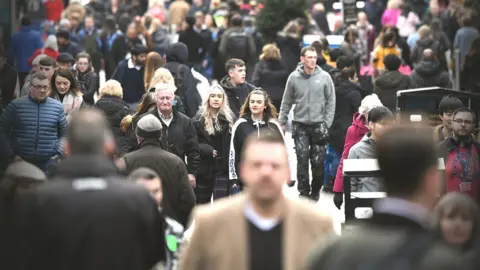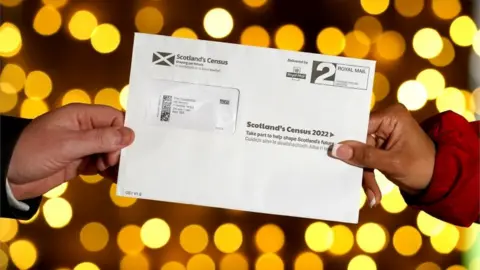Scottish census deadline extended after poor response
 Getty Images
Getty ImagesThe deadline for completing Scotland's census has been extended until the end of May because of low completion rates.
Just under a quarter of households have still to send a response to the survey.
The Scottish government said it would keep it open for an extra four weeks, until 31 May.
Scotland's constitution secretary, Angus Robertson, told Holyrood it was important for the government to hear the voices of the households still to return their surveys.
Census letters were sent to 2.7 million homes, representing 5.5 million people.
Two million households have filled in their survey responses, equating to 77.2%, but an estimated 604,000 had still to submit them last week.
Mr Robertson told the chamber: "I cannot stress enough how important it is for the government to hear the voices of the remaining 604,000 households who are still to return before the deadline of Sunday 1 May."
He said the figure included thousands who had requested a paper copy but had not yet returned it, and "many thousands" who had started the census online but had not yet finished the survey.
This was the first time paper forms were not sent to every household in Scotland. People were asked to complete the form online, although paper copies could be requested.
Mr Robertson said: "To be effective, a census requires a high response rate and one that requires the diversity of our communities and their needs appropriately."
The extension will be supported by extra funding of £9.76m - an additional 7% of the census programme costs.
Civic and legal responsibility
Anyone who fails to submit a response by 1 May could face prosecution - with a fine of up to £1,000.
Mr Robertson stressed completing the census was not just a legal but a civic responsibility.
Scotland's Census Day was Sunday 20 March. Every single person in the country should be accounted for in the once-in-a-decade survey.
It was held over from 2021 because of the Covid pandemic. Mr Robertson said the decision to move the census was not taken lightly and remained the right decision.
 PA Media
PA MediaHowever, the survey went ahead in England and Wales with high levels of completion - 97% of households took part, with 88.9% completing the form online.
In 2011, the last time the Scottish census took place, 95% of households replied.
There are concerns that decoupling the Scottish survey from the rest of the UK had reduced awareness.
Mr Robertson said an extension to the census collection period remained "a legitimate and often used process to facilitate engagement".
He also noted that other countries including Poland, Japan and the US had previously taken similar actions to increase participation.
Some communal establishments in England and Wales were given extra time to provide information and Northern Ireland continued to accept returns after the deadline, he added.
'Help out there'
The census collects information which helps the Scottish government and other organisations make sure they provide the right services for people.
The topics include household relationships, health, type of accommodation, age, and employment.
New questions include the use of British Sign Language, passports held, sexual orientation and transgender status.
Mr Robertson added: "It is vital that we secure as high a response rate as possible so that the census can be effective in delivering its many benefits for future public services."
He urged anyone who was yet to complete the census to act now.


There will be hard questions over why so many households have failed to complete the census but it would be wrong to jump to any conclusions. The most obvious is whether it was wise to primarily carry out the census online?
There is a portion of the population, including some elderly and vulnerable people, who may not be able to do this easily. Anyone unable to - or who simply preferred to do it the old-fashioned way - had to actively request a paper copy.
But this alone is unlikely to explain the low return rate.
Did some people miss the letter telling them about the census? Perhaps they wrongly assumed it was junk mail and put it in the bin? The old paper census form was a substantial document which was hard to miss on the doormat.
Did the decision to hold the census a year later than in the rest of the UK mean there was a lower level of public awareness? Some may have felt uncomfortable with questions about their sexuality and trans status, but these questions were entirely voluntary.
At this point there are no simple answers but all these issues are worth probing.
